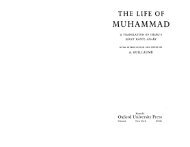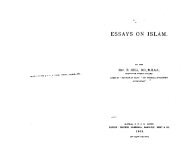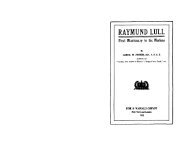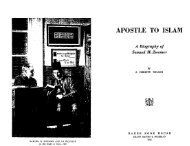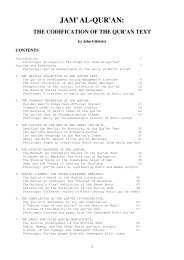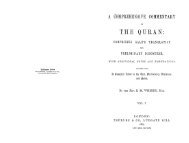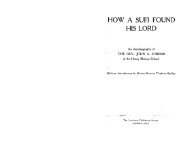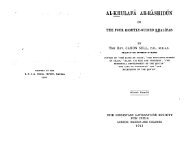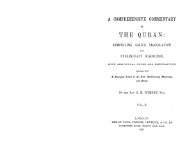Islam Its Belief and Practices - Radical Truth
Islam Its Belief and Practices - Radical Truth
Islam Its Belief and Practices - Radical Truth
Create successful ePaper yourself
Turn your PDF publications into a flip-book with our unique Google optimized e-Paper software.
30 ISLAM ITS BELIEFS AND PRACTICES FOUNDATIONS OF FAITH 31<br />
for those who like it, horses for those who wish to ride,<br />
camels, fields, in short, "Things which eye saw not <strong>and</strong><br />
which did not enter into the heart of man."<br />
Among these there is also said to be a tree called<br />
Tiibli not mentioned in the Qur'an, on which grow pre<br />
~ious' jewels <strong>and</strong> fine clothes. On entering Paradise<br />
believers will be youthful looking creatures, beardless,<br />
36 years of age <strong>and</strong> they will grow neither older nor<br />
younger.<br />
The highest delight, however, is said to be referred<br />
to in 10: 27 which is said to have a reference to the vision<br />
of God when He will be seen face to face. Mu1}ammad<br />
said, "You will see your Lord as you see this moon."<br />
VI.<br />
<strong>Belief</strong> in Predestination.<br />
The faith in predestination is thus described:<br />
Faith in the decrees of God, is that we believe in our<br />
heart <strong>and</strong> confess with our tongue that the most High God<br />
hath decreed all things, so that nothing can happen in the<br />
world whether it concerns the condition <strong>and</strong> operations<br />
of things, or good <strong>and</strong> evil, or obedience <strong>and</strong> disobedience,<br />
or faith <strong>and</strong> infidelity, or sickness <strong>and</strong> health, or riches <strong>and</strong><br />
poverty, or life <strong>and</strong> death, that is not contained in the<br />
written tablet of the decrees of God. The orthodox<br />
Muslims are divided in the following three Schools of<br />
faith on the question of predestination:<br />
(1) JABARIYA: From the word Jabar meaning compulsion.<br />
They deny all free agency in man <strong>and</strong> say<br />
that man is necessarily constrained by the force of<br />
God's eternal <strong>and</strong> immutable decree to act as he<br />
does. They hold that as God is the absolute<br />
Lord, He can, if He so wills, admit all men into<br />
Paradise or cast all into hell.<br />
(2) QADARIYA: They deny al-qadar or God's absolute<br />
decree. They say that evil <strong>and</strong> injustice ought<br />
not to be attributed to God, but to man who is<br />
altogether a free agent.<br />
(3) ASH'ARIYA: It is a branch of Jabariya. According<br />
to the teaching of this school the movements<br />
<strong>and</strong> the will of men are created by God <strong>and</strong> predestinated<br />
by Him but they are created in such<br />
a manner that at the same time they are acquired<br />
by him. This doctrine is called kasb, acquisition.<br />
This doctrine is explained in the following words<br />
by Dr. Macdonald: "Man cannot create anything;<br />
G0d is the only creator. Nor does man's<br />
power produce any effect on his actions at all.<br />
God creates in His creature power (qudra) <strong>and</strong><br />
choice (ikhtiyar). Then He creates in him his<br />
action corresponding to the power <strong>and</strong> choice<br />
thus created. So the action of the creature is<br />
created by God as to initiative <strong>and</strong> as to production;<br />
but it is acquired by the creature. By<br />
acquisition (kasb) is meant that it corresponds to<br />
the creature's power <strong>and</strong> choice, previously<br />
created in him, without his having had the slightest<br />
effect on the action. He was only the locus or<br />
subject of the action. In this way al-Ash'an is<br />
supposed to have accounted for free-will <strong>and</strong><br />
entail responsibility upon men."<br />
The Ash'arite school is recognised by the orthodox<br />
Sunnis <strong>and</strong> is the most widely accepted doctrine at the<br />
present time. The Qadarite view was that of the<br />
Mu'tizilites, the early rationalists of <strong>Islam</strong>. The following<br />
are arguments as used by the Ash'arites <strong>and</strong> Qadarites<br />
in support of their doctrines:<br />
Ash'arite objections to the Qadarites.<br />
(1) If a man is the cause of an action by the force of his



